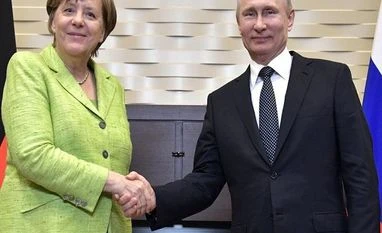As Donald Trump shakes up the global order, German Chancellor Angela Merkel is being pushed closer toward a more predictable partner in Moscow.
When President Vladimir Putin hosts Merkel in the Black Sea resort of Sochi on Friday, he’s likely to notice a change in tone from a tense meeting a year ago when the two leaders clashed over Ukraine and Russian election meddling. Now they’re in the same corner trying to shield businesses from US sanctions, defend the Iran nuclear accord ditched by Trump and rebuffing American objections to a new gas pipeline linking Russia and Germany.
Rapprochement with Russia is now a core policy objective in Berlin, according to a senior German official with knowledge of the chancellery’s strategy. The shift in sentiment is a consequence of the actions of a U.S. president who is straining the long-standing alliance with Europe, and in the process throwing together two seasoned survivors of geopolitical turmoil who share a contentious but well-honed relationship.
Merkel and Putin are both in their fourth terms, though not about to become best of friends. Germany, for example, doesn’t intend to ease European Union economic sanctions on Russia over its incursions into Ukraine. The Kremlin is still relishing the entente, regarding it as an opening to strengthen its influence with Germany and Europe more broadly.
“Putin likes the irritation that Trump has created with Europe,” said Josef Janning, head of the Berlin office of the European Council on Foreign Relations. “In his eyes, I think, the development is quite positive.” The Russian leader tried to intimidate Merkel in the past, said Janning, “but she’s still around -- like he is.”
Pipeline Diplomacy
For Putin, it’s an opportunity to chip away at his diplomatic isolation from Europe since Russia was dropped from the Group of Eight in 2014. For Merkel, the stakes are as much about projecting European values in a globalized age as about protecting German economic interests in Iran and Russia.
That includes Nord Stream 2, which Putin and Merkel have a joint interest in completing over U.S. objections. The Trump administration has threatened sanctions on companies working on the pipeline because more Russian gas would bypass Ukraine on its way to Germany.
Before meeting Putin, Merkel dispatched one of her top troubleshooters to Ukraine and Russia to help clear remaining obstacles on Nord Stream 2.
On the global stage, Trump’s exit from the Iran deal is an opportunity for Russia to show it’s an indispensable partner, according to a government official familiar with Putin’s thinking. Iran will be on the agenda for both Merkel and French President Emmanuel Macron, who’s appearing with Putin at the St. Petersburg Economic Forum next week.
“When opinions coincide, it already means that countries become a little bit closer at least,” Yuri Ushakov, a Kremlin foreign policy aide, told reporters in Moscow. The Sochi meeting between Putin and Merkel will be a “very important contact,” he said.
Double Agent
It’s the latest turn in a long-running relationship between the two leaders marked by Putin’s taunts and Merkel’s cold shoulder for his seizure of Crimea and backing of a pro-Russian separatist rebellion in eastern Ukraine. Most recently, Germany joined in the mass expulsions of Russian diplomats in response to the nerve-agent poisoning of a former double agent in England.
Yet for all the tension, they’re known quantities to each other and share a historic bond. Merkel, a Russophile and Russian speaker who grew up in communist East Germany, and Putin, a former KGB agent who served in the eastern German city of Dresden, are familiar with each other’s background like perhaps no other major world leaders. And throughout the turmoil, they have kept lines of communication open. They spoke by phone as recently as Friday.
Merkel said her trip is a routine visit at the start of her new term, which began in March. “That’s completely separate from the problems we’re just having with the situation in the U.S.,” she told reporters at an EU summit in Sofia on Thursday.
Even as the German leader seeks out Russia, Trump’s spurning of global conventions on climate, trade and the Middle East is spooking her. To illustrate the risk of an unravelling multilateral order, Merkel has referred repeatedly to the Thirty Years’ War, which began in 1618 and laid waste to Europe after seven decades of relative peace between Roman Catholics and Protestants.
That’s about the same time that’s passed since the end of World War II spawned global institutions such as the United Nations, Merkel has said, most recently a week ago in Muenster, Germany. In the same speech, she escalated her rhetoric against Trump, saying his exit from the Iran deal “damages trust in the international order.”
Richard Grenell, the newly inaugurated U.S. ambassador to Germany who fueled tension on his first day as Trump’s envoy, has little time for Merkel’s thesis.
“I don’t buy that at all,” Grenell said in Berlin last week when asked about the chancellor’s remarks on trans-Atlantic relations. “We have disagreements, but we’re deep friends.”
Unlock 30+ premium stories daily hand-picked by our editors, across devices on browser and app.
Pick your 5 favourite companies, get a daily email with all news updates on them.
Full access to our intuitive epaper - clip, save, share articles from any device; newspaper archives from 2006.
Preferential invites to Business Standard events.
Curated newsletters on markets, personal finance, policy & politics, start-ups, technology, and more.
)